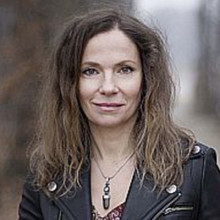Polish literature

Joanna Bator
(born 1968) is a novelist, journalist and university lecturer. Her first publication was an academic work entitled Feminism, Postmodernism, Psychoanalysis (2001). A year later her first novel appeared, A Woman. However, it was only her third book, The Japanese Fan (2004), that brought her wide acclaim, a collection of essay-style reportage resulting from a two-year stay in Japan. It is an original work, which won the Beata Pawlak prize among others, and has become a classic guide to Japanese culture and customs.
After a few years’ silence Bator showed a completely new side to her writing by publishing a two-part novel set in the town where she was born and covering several decades, from the Second World War to the present. Although Sandy Hill (2009) and Cloudalia (2010) have been defined by the critics as a family saga, this classification should not be taken too literally. The main characters in Sandy Hill are in fact members of the Chmura (“Cloud”) family, but their story is supplemented by the fortunes of the neighbours, the residents of a block of flats known as Babel, and their friends. This tendency grows in the second part, in which the young Dominika Chmura leaves her home town and travels about the world, and the people she encounters are assigned their own separate stories. In this way Bator entirely frees herself from the limitations of time and space. It is actually hard to impose any sort of genre straitjacket on this two-part work, as it combines historical fiction, novel of manners, the above-mentioned saga, anthropological treatise and utopian novel. It is also hard to say that the second book is a sequel to the first because it is in a different style. What makes them into a whole is Bator’s way of depicting, her sense of humour, and the fact that she makes use of academic tools for the characterisation of her protagonists, though she consistently avoids academic language. Her undoubted talent for the epic was confirmed by nominations for two prestigious awards, the NIKE and the Gdynia (both for Sandy Hill).
BIBLIOGRAPHY
- Feminizm, postmodernizm, psychoanaliza, Gdańsk: słowo/obraz terytoria, 2002.
- Kobieta, Warszawa: Twój Styl, 2002.
- Japoński wachlarz, Warszawa: Twój Styl, 2004.
- Piaskowa Góra, Warszawa: W.A.B., 2009.
- Chmurdalia, Warszawa: W.A.B., 2010.
- Japoński wachlarz. Powroty, Warszawa: W.A.B., 2011.
- Ciemno, prawie noc, Warszawa: W.A.B., 2012.
- Rekin z parku Yoyogi, Warszawa: W.A.B., 2014.
- Wyspa łza, Kraków: Znak, 2015.
- Rok królika, Kraków: Znak, 2016
TRANSLATIONS
Bulgarian:
- Тъмно, почти нощ [Ciemno, prawie noc], transl. Krum Krumov, Sofia: Ciela Norma, 2017.
Croatian:
- Pješčana gora [Piaskowa Góra], transl. Mladen Martić, Zaprešić: Fraktura, 2013.
Czech:
- Pískový vrch [Piaskowa Góra], transl. Iveta Mikešová, Praha; Litomyšl: Paseka, 2015.
French:
- Le Mont-de-Sable [Piaskowa Góra], transl. Caroline Raszka-Dewez, Lausanne: Les Éditions Noir sur Blanc, 2014.
German:
- Sandberg [Piaskowa Góra], transl. Esther Kinsky, Berlin: Suhrkamp, 2011.
- Wolkenfern [Chmurdalia], transl. Esther Kinsky, Berlin: Suhrkamp, 2014.
- Dunkel, fast Nacht [Ciemno, prawie noc], transl. Lisa Palmes, Berlin: Suhrkamp, 2016.
Hebrew:
- Har ha-hŵl [Piaskowa Góra], transl. Ilay Halpern, Jerusalem: Keter Books, 2012.
- Ḥoshekh, ki-meʻaṭ lailah [Ciemno, prawie noc], transl. Ilay Halpern, Jerusalem: Keter, 2018.
Hungarian:
- Homokhegy [Piaskowa Góra], transl. Péter Hermann, Budapest: Magvető, 2011.
- Homokfelhő [Chmurdalia], transl. Péter Hermann, Budapest: Magvető, 2014.
- Szinte éjsötét [Ciemno, prawie noc], transl. Péter Hermann, Budapest: Magvető, 2016.
Macedonian:
- Piesoczna planina [Piaskowa Góra], transl. Aneta Todewska, Skopje: Makedonska Rech, 2013.
- Tiemno, rieczisi nok [Ciemno, prawie noc], transl. Aneta Sapeta, Skopje: Makedonikja Litera, 2015.
Serbian:
- Mračno da skoro je noc [Ciemno, prawie noc], transl. Jelena Jović, Beograd: Korektura Booka 2016.
Slovenian:
- Peščena gora [Piaskowa Góra], transl. Staša Pavlović, Tina Podržaj, Novo mesto: Goga, 2017.
- Temno, skoraj noč [Ciemno, prawie noc], transl. Jana Unuk, Ljubljana: Cankarjeva založba, 2018.
Ukrainian:
- Piszczana Gora [Piaskowa Góra], transl. Natalka Sniadanko, Lviv: Astrolabia, 2015.